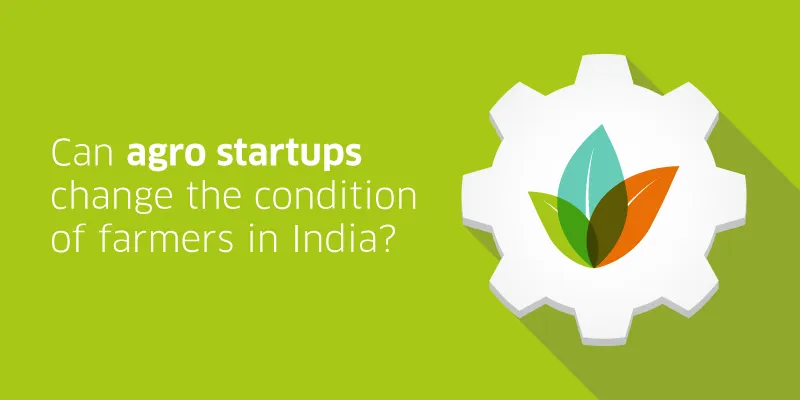Can agro startups change the condition of farmers in India?
'Crop failure: Unable to pay off debt, farmer kills self' has made headlines after a high proportion of farmers’ deaths in the country. According to the National Crime Records Bureau (NCRB), 5,657 farmers committed suicide in 2014. Till September this year, 2,016 farmers have committed suicide in Maharashtra alone, which is the highest number recorded in the past five years. Odisha, Gujarat, Uttar Pradesh, Karnataka, Punjab, Madhya Pradesh, Chhattisgarh, and many more states are witnessing such deaths.

Bankruptcy or indebtedness, family problems, and farming-related issues were the three key reasons behind these suicides, taking the toll to a whopping 3,267 deaths in 2014.
Relief package, 2006; Agricultural debt Waiver and Debt Relief Scheme, 2008; Money Lending (Regulation) Act, 2008; Maharashtra relief package, 2010; Kerala Farmers' Debt Relief Commission (Amendment) Bill, 2012, among others, were some of the initiatives taken by both the central and state governments to reduce the burden of the farmers. However, the government's response and relief packages have generally been ineffective and failed to address the issue.
According to experts, these initiatives mainly focussed on credit and loan, rather than income, productivity, and farmer prosperity. Assistance in paying off outstanding principal and interest benefited the moneylenders, but has failed to create reliable and good sources of income for the farmers. The usurious moneylenders continue to offer loans at interest rates between 24 and 50 per cent, while income generating potential of the land the farmer works on has remained low and subject to weather conditions.
We have no control over the weather. Government initiatives (relief packages and amended act) have offered little help to needy farmers. Thus, is there any long-term solution existing for farmers? Can agro startups really help farmers and win lives over deaths?
Addressing issues
“Productivity and distribution are fundamental problems faced by Indian agriculture,” concurs Sahil Kini, Vice President, Aspada. Aspada Investment is a VC that invests in sectors which create a social impact. He adds that agro startups are trying to address the other important part of agriculture – income, productivity, and farmer prosperity.
He says that on the productivity front, there exists a tremendous “yield gap” between the average yields of Indian farms when compared to global peers.
One of the main reasons for this gap is poor quality farm inputs (seeds, fertilisers), along with lack of farmer education on best practices in farming. In addition, small farm sizes imply that farmers often cannot afford mechanisation that is commonplace in developed countries.
Another cause is the agricultural supply chain in India that only serves to compound the shortfall created by the yield gap driven by poor productivity. There are up to six intermediaries post-harvest that lead to both loss in quality because of poor handling and margins being skimmed at each level for no value addition. Multiple intermediaries also means that up to 40 per cent of our produce is wasted in transit, thanks in no small measure to the lack of cold-chain transportation. India has only 8,000 refrigerated trucks capable of transporting fresh produce. As a result only four million of the 104 million tonnes of fresh produce that are transported every year in the country moves through refrigerated transport.
In India, the productivity challenge can be addressed through spanning input sales, farmer education, farm mechanisation and bringing efficiencies into the supply chain. The rewards for these measures are transformational productivity improvements (2-5x) against a few percentage points.
India's diversity of climate and top-soil that makes it one of the few countries in the world capable of growing almost any grain, fruit or vegetable in abundance. Yet the productivity of most Indian farms are significantly lower that of the rest of the world. Small land holdings are a significant factor for this and the typical Indian farm is 1/100th the size of a typical American farm.
“The increase in production can also address the issue of indebtedness in farmers. We can, to a large extent, reduce the impact of financial loss through high productivity,” says Adwitiya Mal, Co-founder and COO, EM3 Agriservices. It provides complete on-farm services using modern agricultural machines and technologies, delivered by the company's own trained personnel on a 'pay-for-use' basis - aggregating, across small farmers, the need for technology.
This is particularly important in a "small farm" paradigm such as ours where it isn't economically viable for most farmers to own and operate all the equipments that are required.
Adwitiya calls this pay-for-use on-farm services model Farming-as-a-Service (FaaS). He offers services through the entire value chain in farming – from land preparation to crop harvesting.
Besides, EM3 Agriservices can play an important role in the financial inclusion of farmers.
When asked, how? “Through Knowledge. As a part of our normal operations, we collect comprehensive information of the farm and on the basis of that provide correct information to banks which provide credit/loans to farmers,” he says.
“Distribution and reach are key factors for financial inclusion. Once you've got that piece in position, having relevant/ appropriately designed financial products is the next critical step. We are building a strong footprint which addresses the "reach" part and since we collect a lot of farm level information, we can play a role in the financial product development as well. Knowledge is key for crop production as well as financial inclusion of farmers” says Adwitiya.







